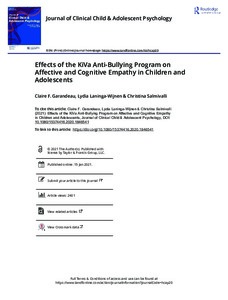Effects of the KiVa Anti-Bullying Program on Affective and Cognitive Empathy in Children and Adolescents
Garandeau Claire F.; Laninga-Wijnen Lydia; Salmivalli Christina
https://urn.fi/URN:NBN:fi-fe2021093048331
Tiivistelmä
Objective: As empathy is an important predictor of both bullying and defending behavior, many anti-bullying interventions aim to increase empathy among students. However, little is known on whether these interventions enhance both affective and cognitive empathy, and whether some students are more responsive than others to empathy-raising efforts. This study examined the effects of the Finnish anti-bullying program KiVa on changes in self-reported affective and cognitive empathy and tested whether these effects varied depending on students’ gender, initial levels of empathy, peer-reported bullying, and peer-perceived popularity, as well as school type (primary versus secondary school) and classroom bullying norms.
Method: Multilevel structural equation modeling analyses were conducted on pretest and posttest (1 year later) data from a sample of 15,403 children and adolescents (Mage = 13.4; 51.5% girls) in 399 control and 462 intervention classrooms from 140 schools participating in the evaluation of KiVa in 2007–2009.
Results: KiVa had a positive effect on affective empathy, but not cognitive empathy. The effects of the program on both types of empathy did not depend on students’ gender, initial levels of empathy, bullying, or popularity, nor on school type or classroom bullying norms.
Conclusion: Findings suggest that KiVa can raise students’ affective empathy regardless of students’ gender, status, initial empathy, or levels of bullying, and regardless of school type or classroom bullying norms.
Kokoelmat
- Rinnakkaistallenteet [29335]
